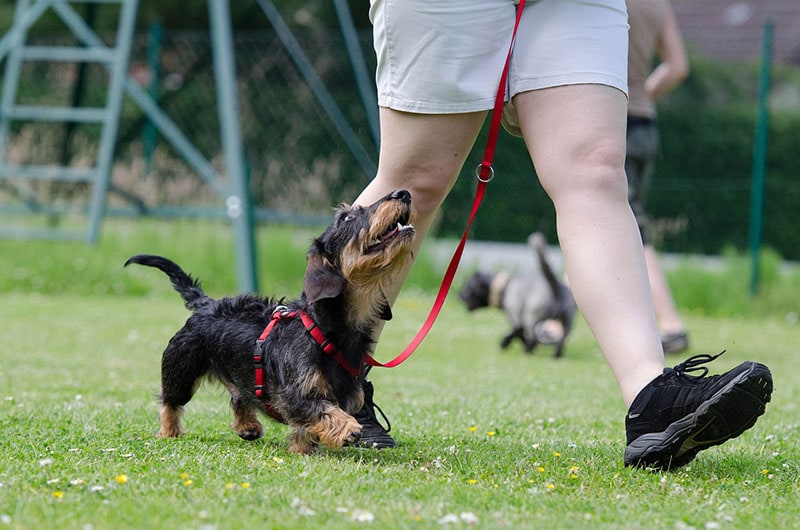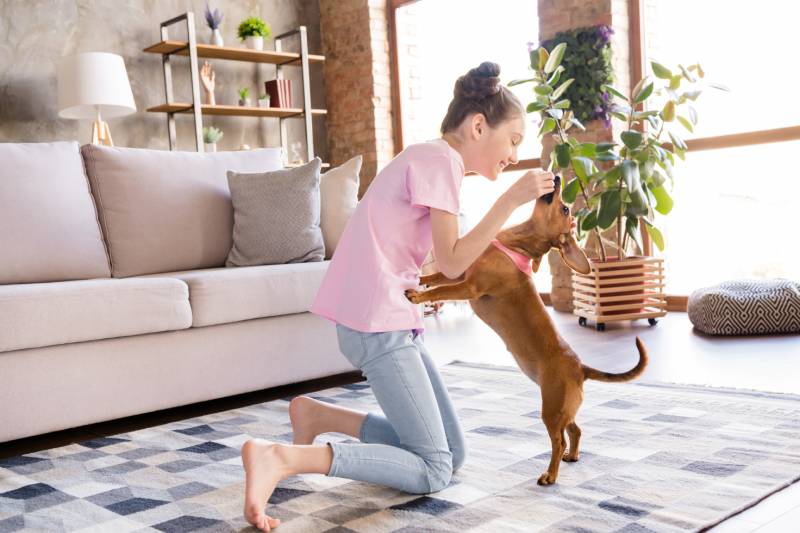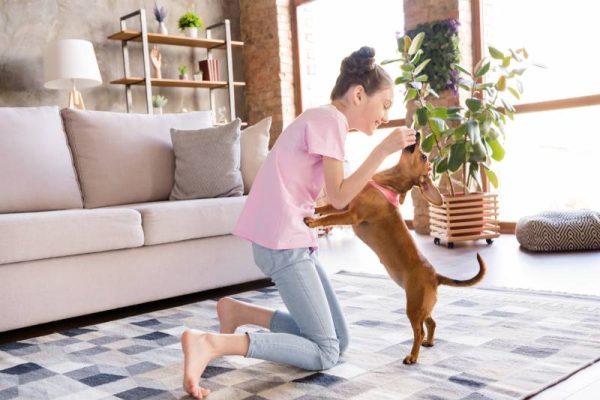Dachshunds are an adorably small breed of dog that has been popular for centuries. Originally bred in Germany to hunt badgers, they are relatively small with long bodies and short legs, which makes them an ideal size for apartment living. However, small size alone does not make a breed a good apartment dog. Lots of other factors go into what makes a dog suited for a smaller, urban environment. Owners need to consider sociability, vocalization, exercise needs, and more.
If you can give a Doxie the workouts and companionship they need, then they can make wonderful apartment-dwelling besties. This article will explore the conditions that can bring out the best in Dachshunds. With the right care and attention, these little pooches rank high on the list of wonderful apartment dogs, well-suited to living in an urban environment.
Characteristics of a Good Apartment Dog
Having a dog can be an incredibly rewarding experience, but not all breeds are cut out for apartment life. While the breed you choose matters, how you set up your home for your dog will also have an impact on whether your pooch thrives living in an apartment. Do your part to help keep them calm. A well-adapted dog will be well-behaved; they will not be stressed, and they won’t bark all the time, especially when they are alone. Separation anxiety can quickly become anti-social.
Just like humans living in apartments, dogs need fresh air and physical and mental stimulation; without it, they will find ways to expend their energy and amuse themselves—a favorite activity of bored dogs is to chew things, usually your stuff! On the extreme end, sad, bored Doxies may even become aggressive and nip or bite strangers, other pets, or even their owners.

How Big Are Dachshunds?
Standard Dachshunds typically get to between 16 to 32 pounds full-grown and about 8 to 9 inches tall at the shoulder. This is much larger than the miniature variety, which usually weighs 11 to 16 pounds when mature and stands about 5 to 6 inches tall at the shoulder. Miniature Dachshunds can be much easier for those with limited space in their homes or apartments due to their smaller size, and they also need less exercise than their larger standard-sized cousins. Both types of Dachshunds make awesome city pets, but for us, the Mini edges out the Standard: it requires even less floor area and exercise.
Exercise
Dachshunds may be small in size, but don’t let their stature fool you—these pups need plenty of exercise to stay healthy and happy. A full-sized Dachshund should get about an hour of exercise daily, while miniature Dachshunds still need at least 30 minutes. Exercise can mean anything from a leisurely walk to an intense game of fetch, partly depending on the age of your dog. Developing and maintaining strong muscles are important for Dachshunds to maintain a healthy back.
Playing with your dog at home and engaging them mentally will also help to keep them in a happy and content state. Exercise is not the only reason you will have to take your dog outside. Unless you want to train your Dachshund to go to the loo in your apartment, you will need to take your dog outside about five times a day. Probably two times a day for walks, and then a further three toilet breaks.

Stair Climbing
Dachshunds are 10x more likely than other breeds to get Intervertebral disc disease (IVDD), with miniature Dachshunds showing the highest prevalence. IVDD is a common spinal condition in dogs that causes back pain, partial loss of function in the limbs, and in more severe cases, paralysis. It is generally thought that regular stair climbing puts undue stress on a Dachshund’s vertebrae and increases the chance of getting IVDD. However, some research suggests the amount of exercise is a bigger risk factor than stair climbing. Other research even found a slight correlation between stair climbing and a lower risk of IVDD.
Unfortunately, the science isn’t yet quite where we need it to be in regard to ascertaining and mitigating the risks. However, for now, most veterinarians advise pet parents to chill with the stair use. The best solution, therefore, is to use the lift and avoid the risk of any repetitive injuries from daily stair climbing, but make sure that your dog has lots of daily exercise with plenty of variety and movement.
Can a Dachshund Be Left Alone for 8 Hours a Day?
When it comes to leaving a pet home alone all day while you go off to work, you may wonder if your beloved mutt will be alright. If you own a small Dachshund, then the answer is simply, “no.” This breed of dog is known to suffer from separation anxiety and acute loneliness if they are left alone for long periods of time.
Doxies form strong bonds with their owners and companions. They require love, care, and attention on a daily basis to be happy and healthy. If they’re not given enough human contact, this can lead to destructive behaviors such as barking or chewing objects around the house out of frustration or boredom. It can also cause depression due to feeling lonely when their owners are away for long periods throughout the day. If you have to regularly leave your pup alone at home, probably 4 hours at a stretch is the maximum you should leave them. More than this your dog’s mental well-being and quality of life will be negatively impacted.

Do Dachshunds Like to Bark?
Dachshunds were bred to hunt, and they were taught to bark. Barking was a big part of how these little sausages telegraphed their location to their masters during a hunt. While the occasional bark is part of a Doxy owner’s regular experience, frequent loud and sustained barking in response to external stimuli shouldn’t be. If you are considering getting a Standard or a Miniature Dachshund, prepare to train them while young not to bark. This might include socializing them with the sights and sounds of apartment life, such as neighbors moving around and making noises, packages being delivered to the door, or cars or pedestrians passing by windows.
You might not know what will stress your dog out until they start barking; whatever the cause and whenever it starts, be prepared to invest time in helping your dog get comfortable in their environment and training them out of their natural response to bark.
How to Train a Dachshund to Stop Barking
It takes time, work, practice, and consistency to train your Doxie to bark less. Regular training and proper techniques will help you see progress. Dogs bark more when you shout because they think you’re joining in. Don’t yell, but speak calmly and firmly. Pick one word to use as a command. Many people choose the word “quiet.” While your dog is barking, say the word “quiet”, calmly but firmly. When they stop barking—shower them with praise and give them a treat. Doxies are clever dogs—they will figure out that “quiet” plus stopping gets them a tasty snack.

Summary
A Dachshund is an ideal apartment dog due to their small size and friendly personality. However, it’s important to remember that exercise and stimulation are essential for these lively dogs, as well as some socialization and training to reduce their barking. With the proper care and attention, a Dachshund can be a wonderful companion and best friend. So, if you’re looking for a furry family member with lots of love and affection, consider bringing home a Dachshund today!
Related Reads:
- Can a Dachshund Be Left Alone in the House? What You Need to Know!
- Will a Dachshund Be Good with Other Dogs in My Home? The Interesting Answer!
Featured Image Credit: RomanSamborskyi, Shutterstock












